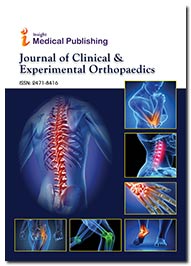Joint Inflammation and Lower Back Torment in Musculoskeletal Disorders
Damien Kinz
Department of Medicine, University of Oxford, Oxford, United Kingdom
Published Date: 2024-08-23DOI10.36648/2471-8416.10.4.296
Damien Kinz*
Department of Medicine, University of Oxford, Oxford, United Kingdom
- *Corresponding Author:
- Damien Kinz
Department of Medicine, University of Oxford, Oxford,
United Kingdom,
E-mail: kinzDam@163.gmail.com
Received date: July 23, 2024, Manuscript No. IPJCEOP-24-19614; Editor assigned date: July 26, 2024, PreQC No. IPJCEOP-24-19614 (PQ); Reviewed date: August 09, 2024, QC No. IPJCEOP-24-19614; Revised date: August 16, 2024, Manuscript No. IPJCEOP-24-19614 (R); Published date: August 23, 2024, DOI: 10.36648/2471-8416.10.4.296
Citation: Kinz D (2024) Joint Inflammation and Lower Back Torment in Musculoskeletal Disorders. J Clin Exp Orthopr Vol.10 No.4: 296.
Description
Musculoskeletal Disorders (MSDs), including conditions like osteoarthritis, rheumatoid joint inflammation and ongoing lower back torment, expand their effect past the actual domain. While these problems basically influence the outer muscle framework, their impact on emotional wellness is significant and frequently underrated. Understanding the interaction among MSDs and emotional wellness is urgent for giving complete consideration and working on generally quiet results. Constant torment, a sign of numerous MSDs, can essentially influence emotional wellbeing. The tenacious uneasiness and useful constraints related with MSDs frequently lead to sensations of dissatisfaction, weakness and hopelessness. Dissimilar to intense agony, which normally settle with injury mending, ongoing agony can endure for quite a long time or even years, prompting a delayed mental weight. People with persistent torment might encounter uplifted degrees of stress and nervousness as they wrestle with progressing distress and the vulnerability of their condition.
Psychological problems
Research has reliably shown that ongoing agony is firmly connected to psychological well-being problems like misery and tension. The steady type of overseeing torment and its impacts on day to day existence can add to a descending twisting of state of mind unsettling influences. The impediments forced by MSDs can influence different parts of day to day existence, including work, social communications and relaxation exercises. People with serious MSDs might battle with undertakings that were once normal, like family tasks or expert obligations. This deficiency of independence and the powerlessness to partake in recently delighted in exercises can prompt social disengagement and diminished personal satisfaction. Social withdrawal is a typical reaction to the difficulties presented by MSDs. People might keep away from parties or exercises because of torment, distress or apprehension about intensifying their condition. This disconnection can additionally add to Asensations of dejection and discouragement. The absence of commitment in friendly and sporting exercises can reduce in general mental prosperity, making a cycle where diminished movement fuels both physical and mental side effects.
Psychological wellness
Survival strategies assume a critical part in moderating the emotional wellness effects of MSDs. People who encourage successful methods for dealing with stress, like care, mental conduct procedures or unwinding works out, frequently experience better emotional well-being results. Emotionally supportive networks, including family, companions and medical care experts, additionally assume a fundamental part in assisting people with dealing with the mental difficulties related with MSDs. Medical services suppliers can offer important help by coordinating psychological wellness care into the therapy plan for MSDs. This can incorporate alluding patients to emotional wellness experts, for example, clinicians or advocates, who can give treatment to despondency and tension. Moreover, patient instruction on overseeing agony and stress through unwinding strategies or mental conduct approaches can engage people to all the more likely handle their condition. Participating in standard active work has been displayed to have huge psychological wellbeing benefits, which can be especially favorable for people with MSDs. Exercise can decrease side effects of despondency and tension, further develop mind-set and improve in general personal satisfaction. For instance, low-influence exercises like swimming, strolling or delicate extending can give help from torment while at the same time supporting emotional well-being. The arrival of endorphins during active work can assist with balancing sensations of trouble and add to a more inspirational perspective. Integrating actual work into the day to day everyday practice of people with MSDs can be an integral asset for working on psychological wellness. Practice tends to actual side effects as well as gives a feeling of achievement and command over one's wellbeing, which can essentially upgrade mental prosperity. Outer muscle issues significantly affect psychological wellness, impacting profound prosperity and personal satisfaction. Persistent agony, useful constraints and social disengagement related with MSDs can prompt critical mental difficulties, including misery and uneasiness. Tending to these emotional wellness influences requires a comprehensive methodology that incorporates physical and mental consideration. By perceiving and tending to the psychological well-being parts of MSDs, medical services suppliers can offer more far reaching and viable therapy, eventually further developing the general prosperity of people living with these circumstances.
Open Access Journals
- Aquaculture & Veterinary Science
- Chemistry & Chemical Sciences
- Clinical Sciences
- Engineering
- General Science
- Genetics & Molecular Biology
- Health Care & Nursing
- Immunology & Microbiology
- Materials Science
- Mathematics & Physics
- Medical Sciences
- Neurology & Psychiatry
- Oncology & Cancer Science
- Pharmaceutical Sciences
